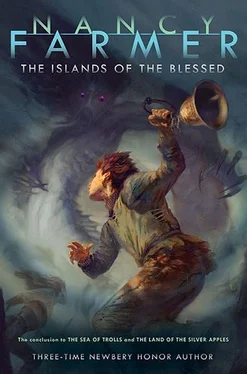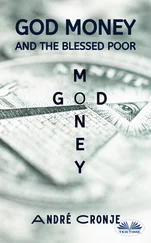Jack’s throat constricted. Sunlight hovered over the sheltering leaves. A thrush opened its beak and sang. A spiderweb shivered delicately in a puff of air. “I see… oh, curse it! I don’t see anything. No, that’s not right. I can see a squirrel, a beetle, a thrush, a spiderweb, but nothing important. I’ll never be a true bard!”
“And what could be more important than a squirrel, a beetle, a thrush, and a spiderweb?” insisted the old man.
“Why…” Jack looked up.
“Exactly. Ever since I took you on as my apprentice, I’ve been training you to see things as they are. Until you do that, you haven’t a hope of looking farther. One night very soon, I want you to sleep here.”
Jack swallowed nervously. The woodland appeared tranquil and safe by daylight, but he knew things could change after dark.
“You asked me what I saw when I was tested at the School of Bards,” the old man said. “The first time I encountered the same sort of creatures as you—a hedgehog, a bat, a doe with her fawn. But the second time—” He fell silent.
What happened the second night? Jack thought wildly. The Bard walked on briskly, and the boy knew he wouldn’t answer any more questions.
They followed one of the paths through the hazel wood.
Bluebells brushed against their ankles, and the sound of water rushing through an unseen brook came to them.
“Look there,” commanded the Bard. Jack’s breath caught in his throat. Where once there had been a dense mass of ancient oaks, a road had been torn out, as though someone had taken a giant sword and slashed right and left through the heart of the forest.
“Typical of Olaf and his thick-skulled bunch to leave a mess,” remarked the Bard, looking out over the destruction.
“Was Thorgil right?” Jack asked. “Did Odin really lead a Wild Hunt here?”
“Something laid waste to these oaks.”
The new road was littered with branches, and water pooled in the center where the ground had been plowed deeper. “If it was a Hunt,” Jack said carefully, “what was it hunting?”
“Not Gog and Magog, poor lads. They were merely unlucky to be in its path,” said the Bard. “The Wild Hunt drives misfortune before it. Plague, famine, and war follow behind. I believe we’re in for an interesting time.”
The sky was bright blue, as though nothing had ever disturbed it, and the air was warm with summer. Jack saw Brother Aiden picking his way through the branches like a small brown sparrow hopping from perch to perch. The monk held aloft a wooden cross and was chanting in Latin. Jack couldn’t understand him, but it was clear that the words were filled with Christian magic.
“Aiden, my friend,” called the Bard, “you’ll be up to your ears in mud if you don’t watch out.”
The little monk looked up and almost slid off a branch. “I must sanctify this place,” he said, bracing his feet. “Evil has been done here.”
“Aye, and evil has been done to the farms as well. We must trade for grain before winter comes.” The Bard strode onto the road—for an old man his step was amazingly sure—and helped Brother Aiden to firmer ground.
“I can mix ink. People always want to buy that,” offered the monk. Brother Aiden was renowned for his magnificent colors, which were used to illuminate holy manuscripts.
“Excellent! I’ll get Pega to help you. Jack and Thorgil can gather herbs for my elixirs. John the Fletcher has a stock of deerskins, and I’m sure I can pry a few coins out of the chief’s wealth-hoard. My stars! That new road is so straight, you could almost believe it was made by Romans.”
Jack looked through the opening to a distant meadow and the hills beyond. A lone bird fluttered from one side to the other of this opening. Its cries reached him from the shadows of a yew. “It sounds… so sad,” he murmured.
The Bard cast a sharp look at him. “Indeed. It is mourning the loss of its young. Have you been taking lessons in Bird from Thorgil?”
Jack grimaced ruefully. “No, sir. The last thing Thorgil wants is to admit she understands it.”
“Insufferable child. She’s made a career of pigheadedness. Stay and help Aiden, lad. I’ll expect you for dinner.” The old man collected the harp and the basket of mushrooms and strode away, leaving Jack uncertain of what he was supposed to do next.
“I’d like it very much if you would sing for me,” Brother Aiden said shyly. “My heart is heavy over the loss of those poor men.” The little monk’s eyes were filled with tears, and Jack knew he was remembering his own escape from the Forest Lord or Satan or whoever led the pack of hunters.
And so Jack sang of the earth when it was gentle and not wild, of the harp in the trees when wind played among the leaves. He sang of fair meadows where deer brought their young, knowing them to be safe, and of the cry of larks tumbling in High Heaven.
Gradually, Brother Aiden’s face cleared and he looked hopeful again. “Thank you,” he said. “Your voice is wonderfully healing, almost as fine as Pega’s.” He began once again to bless the raw wound in the forest.
Jack gazed down the passage, thinking, This is the path Odin took with his warriors, if Thorgil saw truly. They passed her by, ignoring one who wanted to join them and taking Gog and Magog, who didn’t. Why does everyone always compare me with Pega?
Feeling slightly nettled, he bade good-bye to Brother Aiden and went home to see whether he could help with repairs.
The last rays of sunlight caught on the wings of swallows as Jack returned to the Bard’s house. The sea, still troubled by distant storms, was lined with foam. The air was beautifully clear, however, with every sound carrying for miles. Jack heard Brother Aiden’s bell from the little beehive-shaped hut where he lived. It trembled like a plucked harp string before dying away into the deepening blue sky—as different from a cowbell as nightingales were from crows.
King Brutus had found it buried in an old chest at St. Filian’s Monastery. Since the monastery already had a bell, and this one was too small for such a grand establishment, he’d sent it to the village. Brother Aiden was delighted.
Until a week ago, he’d made do with a rusty instrument that clanked rather than rang.
This was the first time Jack had heard it, and it filled him with a longing he didn’t quite understand. It sounded again. Brother Aiden would be kneeling in prayer; the bell was to call whoever wished to join him. Jack thought it odd that sound traveled farther than sight, for Brother Aiden was too far away for Jack to see even the fire outside his hut.
Thorgil said that sounds never really died. She said the Northmen heard their dead calling to them on nights when lights danced in the sky. Jack had never seen such a thing and didn’t want to.
The bell rang a third time, and from the sea came a terrifying wail. Jack’s hand went to his knife. The cry faded to a sob and then ceased altogether. He waited tensely, scanning the distant waves. He saw a long, discolored patch of sea moving toward shore, and then it was gone.
Probably seaweed, thought Jack. Still, he watched until darkness forced him to go on.
Inside the Bard’s house, a cheerful fire sprouted green, red, and yellow flames as it burned driftwood. An iron pot bubbled with the enticing smell of mushrooms. Jack sighed with happiness. Everything was as it should be. The painted birds on the walls moved in the firelight, and a painted breeze appeared to ruffle the leaves of a flower garden.
Jack was about to ask the Bard whether he’d heard the cry when he saw the old man feeding scraps of dried fish to a large, bedraggled-looking bird. Thorgil was squatting beside him, engaged in conversation—to go by the croaks—with the bird. She didn’t look pleased, and Jack guessed the Bard had bullied her into performing.
Читать дальше










